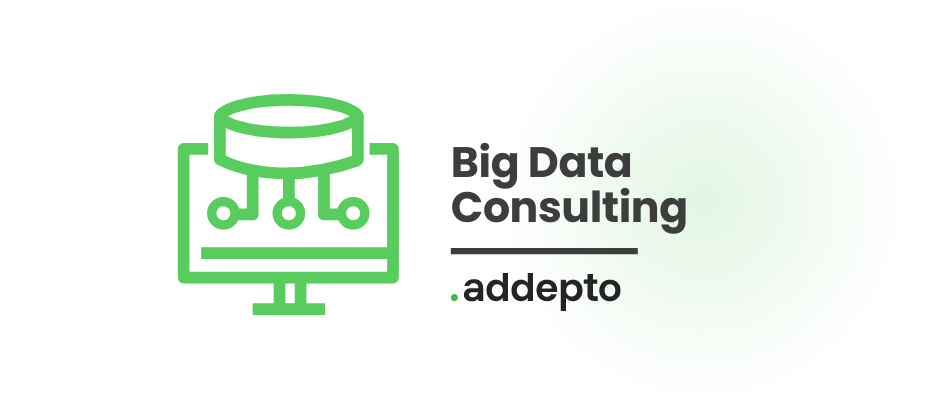
March 08, 2021
Big data and its business impacts
Author:

CEO & Co-Founder
Reading time:
13 minutes
Big data and its business impacts – it’s a subject that’s particularly interesting in 2021 when big data plays a more and more significant role in the business environment. In fact, we can even say that if your company doesn’t utilize big data–you’re losing the race. Every company that wants to get ahead of their competition has to master big data in business and understand the impact of big data on the business. And in this article, we are going to show you why.

In 2006, Clive Humby, a renowned British mathematician and entrepreneur in the field of data science and customer-centric business strategies, coined the phrase “Data is the new oil“. Today, these words are still up to date. We’re currently in the fourth industrial revolution, so-called industry 4.0. This revolution is shaped by many technologies, such as artificial intelligence, machine and deep learning, the
Internet of Things, smart manufacturing, and several others. What do all these technologies have in common? They are all based on big data.
Actually, without big data and data analytics, industry 4.0 never could have come into existence. And when you take a look at the numbers, they tell an amazing story[1]:
- It’s estimated that a whopping 97% of companies invest in big data technology.
- By 2021 every person will generate about 1.7 megabytes of data… per second.
- By 2023, the big data analytics market is expected to reach 103 billion USD. The big data market is projected to grow by 20% annually.
These numbers are even more staggering when you realize that in 2012 just 0.5% of all data was actually being analyzed! Thankfully, organizations all around the globe quickly understood the real potential hidden in data.
And here we are today, in early 2021: Not just every person on Earth is producing massive amounts of data each day; companies are carefully analyzing it in order to draw useful business conclusions. And what might these conclusions be?
How is big data used in business?
If we had to answer this question in just one sentence, we would say that big data transforms your business into something way better. But luckily, we can tell you something more 🙂
Today, big data and business go hand in hand in order to improve the way we work, buy, sell, and spend time. Let’s see what the current impact of big data on business is:
Big data reduces costs
For starters, big data, frequently tied with business intelligence, helps in finding solutions that can reduce costs and improve operational efficiency. Let’s use a simple example of a production company. Processes like quality assurance, quality control, and testing can involve many complications and are simply expensive, particularly in industries like pharmacy, aviation, and nanotechnologies.
Big data analytics can provide your company with insights on the impact of different variables on the production process, thus helping you make better decisions that allow you to cut costs.

In many instances, proper use of big data analytics frequently leads to finding new solutions and discovering new approaches that help you save money. These savings can be related to, i.a.:
- Better operations
- Automation of processes
- Finding cheaper replacements
- Analyzing business activity, and several other aspects of running a business
Big data increases sales
Imagine that you have access to a solution that helps you tailor your offer to your customers’ needs and offer products that are more likely to succeed on the market. Let’s say the same tool helps you measure traffic on your website or in your online store and describe your target audience’s characteristics. With this special tool, you understand your customers better, know what they need, and know how to give it to them. It does sound interesting, doesn’t it?
We think you’d agree that, with such a tool, you’ll be able to significantly increase your sales, right? In many ways, it’s big data in business that provides you with this opportunity. Of course, it’s not a magic wand; you still need to do your part, but, in essence, this is what big data is all about–it helps you sell more.

Think about the optimal pricing strategy. Perhaps you think it’s impossible to reach. After all, there are many approaches to this question, and none is universal. However, it doesn’t mean that setting a perfect pricing strategy is impossible.
Companies use various AI-fueled tools that help them set their prices in the best possible way so that they’re both attractive to customers and ensure the entire business’s profitability. An example of such an interesting, intelligent solution is Dealavo, a Polish company that uses AI to monitor and adjust prices.
Big data improves the decision-making process and help you with discovering trends
What does the typical decision-making process look like? Especially in SMEs, there is no such thing; there’s just the owner’s or manager’s intuition. And let us set the record straight–it’s not a reliable way of making significant business decisions.
Now, let’s say you have access to all the relevant information in your company and the market. You want to make a decision, perhaps about HR processes. And you get access to all your employee, financial, and operational data. With such a backup, making an accurate decision is a breeze! Big data analytics gives you access to all the information you need to make an informed, well-thought-out decision.
Let’s focus on trend analysis. Finding trends in data allows you to gain priceless knowledge! For instance, you can predict/examine:
- What your customers are interested in
- How the demand for your products or services can change in the near future
- What products and services are (and will shortly be) in-demand
It’s all possible because online customer behavior is currently being thoroughly measured (just to mention Google’s and Facebook’s efforts). When you combine customer data with market data, you can estimate what people are likely to buy and under what circumstances.

Big data helps you with customer service
Take a look at these two numbers[2]:
- 58% of enterprises experience a significant increase in customer retention and loyalty as a result of using refined customer analytics
- 44% of enterprises gain new customers and increase revenue as a result of adopting and integrating customer analytics into their operations
Companies all around the globe gather information about their customers and the orders they place. The idea is simple–to understand the customer behavior and respond to the market’s needs. This is how big data helps companies with improving their customer service.
Also, more and more communication channels are based on big data and AI. Consider chatbots and voicebots. These intelligent assistants are designed to enable 24/7 communication and instant responses to straightforward queries. This way, customers don’t have to wait in line waiting for the helpline consultant to pick up the phone. We are all familiar with this situation.
Let’s say you want to ask your internet provider why your Internet connection is unstable. You brace yourself and decide to call their helpline. And after a few seconds, you realize how big a mistake that was: “You have reached our company. Your call is important to us. Please hold while we connect your call…” With chat and voice bots, no such problem exists.

Big data improves HR
Did you know that as much as 100% of sourcing, screening, and matching candidates can be automated? And did you that about 20% of communication between the candidate and the HR manager can also be automated (for example, meeting scheduling)? With big data analytics, your HR department is freed from time-consuming, repetitive tasks like resume screening. This way, your HR professionals can focus on more meaningful assignments.
Today, AI-powered HR tools are mushrooming, and for a reason–they are simply effective! With the support coming from big data analytics tools and intelligent algorithms, your company can:
- Automate the initial selection of candidates
- Find the most promising candidates
- Identify the most efficient recruitment channels (Do you know which one works best in your case? Indeed.com or LinkedIn?)

Big data builds competitive advantage
Increased sales, decreased costs, a more effective decision-making process, enhanced hiring strategy–these are the elements that help you build your enterprise’s competitive advantage. We could say that big data enhance your business in many areas and ways. All of them are crucial when it comes to the development and growth of a company.
You now know what’s the impact of big data on the business. Let’s go further and take a look at what industries are using big data in business.

Big data and its business impacts: Industry overview
We indicated four crucial industries and sectors that extensively use big data in business:
Banking and finances
76% of financial services institutions are currently big data users.
The fact is financial institutions possess and utilize a lot of information about customers and the market. They know how much money we make, where our money comes from, what we are spending it on, and what kinds of services we use. It is obvious that these organizations want to make the most of that data.
And many of them use big data to enhance the offer and make more money or personalize their offers (93% of answers). But when it comes to financial companies, they also use big data for risk assessment (89%), fraud detection (86%), and security threat detection (86%)[3].
Did you know that SAS has anti-money laundering software? They use AI, machine learning, intelligent automation, and advanced network visualization in order to fight money laundering and terrorist financing. According to SAS, their software helped financial institutions achieve more than 90% model accuracy, reduced false positives by up to 80%, and improved the SAR conversion rate fourfold[4].
Impressive!

Logistics
Big data is everywhere in this sector. Warehouse operators, courier companies, airlines, and other transportation companies use big data to optimize their work. Warehouses are now filled with modern
AI-based technologies that accelerate the work. Let’s take Amazon Robotics as an example. Did you know that Amazon has autonomous bots in their warehouses? These robots are helping the company pick and pack parcels and fill orders. And it goes further! Amazon has another type of robot. Amazon Scout robots offer autonomous delivery of products:
They are already delivering orders in some suburban areas in the United States. We can expect shortly to see more and more similar applications on our streets. And maybe another example. Courier companies that use aircrafts to transport their parcels can schedule flights and predict delays based on weather data.
Moreover, they can estimate the demand for storage space in every aircraft. This way, they save time and money.

Marketing
Perhaps it’s the most straightforward example, but the fact is big data plays a critical role in marketing, especially performance marketing, a technique exclusively based on big data that aims at delivering the best possible measurable results. Currently, there are two most significant channels that allow you to reach almost 100% of Internet users and adopt marketing big data in your company. These channels are Google Ads and Facebook Ads.
Both these giants use big data to optimize their campaigns and offer more personalized customer service. Facebook is simply an endless source of big data regarding customer habits, expenditures, free time, interests, professions, and beliefs. And with over 2.5 billion active users, the biggest social network in the world[5] is also one of the best places to advertise your products and services.
Now, let’s switch from Facebook and think about e-commerce. Online stores also have access to much vital information, especially regarding purchases and transactions. Stores use this knowledge concerning transactional data to understand their customers. As a result, they can provide users with precise product recommendations and attractive offers.
Furthermore, this knowledge (when it comes to each user’s activity in a store) can also be used in order to devise an effective remarketing strategy, which is based on showing ads of the product that your customers were already interested in. With a properly set remarketing strategy, you can increase the chances that eventually, some of your customers can place an order and buy the given product.

Agriculture
The adoption of big data analytics in agriculture has been increasing consistently. Currently, the market size is expected to grow from 585 million USD in 2018 to 1.2 billion USD by 2023, at a CAGR of over 16%![6]
Most likely, you don’t realize that, but modern agriculture and farming is deeply based on big data!
Farmers use big data to assess the weather conditions in order to get the maximum productivity from the land. But it goes further, as agriculture is based on IoT devices and sensors. These sensors are actually plugged almost everywhere:
- In tractors and other vehicles
- Fields and soil
- Plants
They help farmers in the collection of real-time data directly from the ground. This way, they help in making more informed decisions regarding crops. For example, big data analytics provides farmers with granular data regarding rainfall patterns, water cycles, fertilizer requirements, and more everyday work elements.
The same solution is used to manage pesticide usage (what pesticides to apply, when, how much). And finally, there’s the farm equipment optimization. Consider John Deere[7]. This company places IoT sensors in their machines and vehicles in order to help farmers track tractor availability, service due dates, and fuel refill alerts. Without a doubt, it’s a massive simplification of the farmers’ work.

In this article, we’ve summarized the subject of big data in business. As you already know, big data is an inseparable part of modern companies, even in such non-IT sectors as farming. Big data in business helps you run your company in a more smooth and efficient way.
If you are interested in this discipline – we encourage you to get in touch with our team. At Addepto, we work with big data analytics every day, and we help companies get the most of the data they possess. Drop us a line and find out how we can help you!
References
[1] Saasscout.com. Big Data Statistics, Growth & Facts 2020. URL: https://saasscout.com/statistics/big-data-statistics/. Accessed Mar 8, 2021.
[2] Freshdesk.com. How Big Data can Drive Better Customer Service. Feb 25, 2019. URL: https://freshdesk.com/customer-support/big-data-blog/. Accessed Mar 8, 2021.
[3] Olga Baturina. 40 Stats and Real-Life Examples of How Companies Use Big Data. May 2, 2019. URL: https://www.scnsoft.com/blog/big-data-use-cases-stats-and-examples#2. Accessed Mar 8, 2021.
[4] Sas.com. Fight money laundering and terrorist financing with AI, machine learning, intelligent automation and advanced network visualization. URL: https://www.sas.com/pl_pl/software/anti-money-laundering.html. Accessed Mar 8, 2021.
[5] H. Tankovska. Number of monthly active Facebook users worldwide as of 4th quarter 2020. Feb 2, 2021. URL: https://www.statista.com/statistics/264810/number-of-monthly-active-facebook-users-worldwide/. Accessed Mar 8, 2021.
[6] talend.com. Big Data and Agriculture: A Complete Guide. URL:https://www.talend.com/resources/big-data-agriculture/ . Accessed Mar 8, 2021.
[7] Internetofbusiness.com. John Deere turns to IoT to make smart farming a reality. URL: https://internetofbusiness.com/john-deere-turns-iot-smart-farming/. Accessed Mar 8, 2021.
Category:




